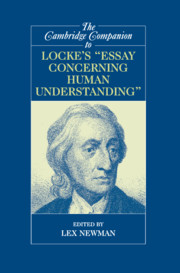Book contents
- Frontmatter
- Introduction
- 1 The Intellectual Setting and Aims of the Essay
- 2 Locke’s Polemic against Nativism
- 3 The Taxonomy of Ideas in Locke’s Essay
- 4 Locke’s Distinctions between Primary and Secondary Qualities
- 5 Power in Locke’s Essay
- 6 Locke on Substance
- 7 Locke on Ideas of Identity and Diversity
- 8 Locke on Ideas and Representation
- 9 Locke on Essences and Classification
- 10 Language, Meaning, and Mind in Locke’s Essay
- 11 Locke on Knowledge
- 12 Locke’s Ontology
- 13 The Moral Epistemology of Locke’s Essay
- 14 Locke on Judgment
- 15 Locke on Faith and Reason
- Bibliography
- Index of Names and Subjects
- Index of Passages Cited
2 - Locke’s Polemic against Nativism
Published online by Cambridge University Press: 28 July 2007
- Frontmatter
- Introduction
- 1 The Intellectual Setting and Aims of the Essay
- 2 Locke’s Polemic against Nativism
- 3 The Taxonomy of Ideas in Locke’s Essay
- 4 Locke’s Distinctions between Primary and Secondary Qualities
- 5 Power in Locke’s Essay
- 6 Locke on Substance
- 7 Locke on Ideas of Identity and Diversity
- 8 Locke on Ideas and Representation
- 9 Locke on Essences and Classification
- 10 Language, Meaning, and Mind in Locke’s Essay
- 11 Locke on Knowledge
- 12 Locke’s Ontology
- 13 The Moral Epistemology of Locke’s Essay
- 14 Locke on Judgment
- 15 Locke on Faith and Reason
- Bibliography
- Index of Names and Subjects
- Index of Passages Cited
Summary
In the seventeenth century, there was a lively debate in the intellectual circles with which Locke was familiar, revolving around the question whether the human mind is furnished with innate ideas. Although a few scholars declared that there is no good reason to believe, and good reason not to believe, in the existence of innate ideas, the vast majority took for granted that God, in his infinite goodness and wisdom, has inscribed in human minds innate principles that constitute the foundation of knowledge, both in practical and in theoretical matters. It was in opposition to the latter group, which included Descartes, leading Anglican divines, and the Cambridge Platonists, that Locke directed his attack upon innate ideas in the first book of the Essay.
In the minds of those who weighed in on one side or the other, the importance of the controversy related to epistemological, moral, and religious doctrines. At the epistemological level, innatists (or, as I will also call them, nativists) held that all knowledge of the natural and supernatural world available to humans is based on fundamental “speculative” axioms, theoretical principles that neither require nor are capable of proof. These principles, such as the causal principle (that nothing comes from nothing) or the principle of noncontradiction (that nothing can both be and not be at the same time), were taken to be both universal and necessary, and hence impossible to derive from experience. To the mind of an innatist, if these principles are not based on experience and are not (as chimerical ideas were thought to be) constructed out of simpler elements by acts of volition, then they are neither acquired nor constructed, and hence must be built into the mind ab initio.
- Type
- Chapter
- Information
- Publisher: Cambridge University PressPrint publication year: 2007
- 9
- Cited by



